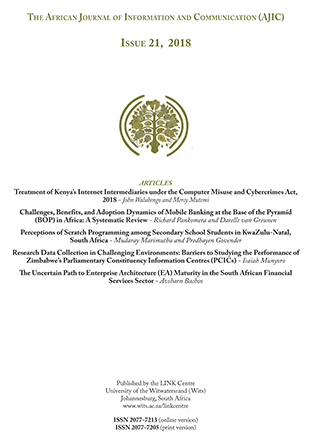Research Data Collection in Challenging Environments: Barriers to Studying the Performance of Zimbabwe’s Parliamentary Constituency Information Centres (PCICs)
Keywords:
research, data collection challenges, qualitative research, politics, law, culture, religion, developing world Zimbabwe, Parliamentary Constituency Information Centres (PCICs)Abstract
This article describes and analyses data collection challenges encountered in the course of research into the performance of Zimbabwe’s Parliamentary Constituency Information Centres (PCICs). During collection of data on the work of PCICs in various constituencies across the country, many of them rural, the following challenges were encountered: low response rates; unreliable road access; unsuitable physical locations of PCICs, including politicised locations; political and legal restrictions; time management and financial challenges; and religious and cultural barriers. The article concludes that researchers planning data collection in developing-world environments must be cognizant of the particular challenges these environments may pose, while at the same time contending with challenges that all researchers, in both developed and developing worlds, face, such as the need ensure strong connections with people based in the local environments in which data collection is to take place.
References
Altshuld, J., & Witkin, B. R. (2000). Transferring needs into solution strategies. Thousand Oaks, CA: Sage.
Bailey, C. A. (2007). A guide to qualitative field research. London: Sage. https://doi.org/10.4135/9781412983204
Bulmer, M., & Warwick, D. P. (1983). Social research in developing countries. London: John Wiley and Sons.
Busby, L. A. (2003). General data challenges facing the Caribbean in the context of sustainable development. Paper presented at "Using information for decision making on sustainable development: Issues and challenges for Caribbean SIDS" seminar, Saint Lucia, 27-28 May.
Cole, A. L., & Knowles, J. G. (2001). Lives in context: The art of life history research. Oxford: Rowman and Littlefield.
Creswell, J. W. (2003). Research design: Qualitative and quantitative approaches. Thousand Oaks, CA: Sage.
Creswell, J. W. (2009). Research design: Qualitative, quantitative, and mixed methods approaches (3rd ed.). Thousand Oaks, CA: Sage.
Creswell, J. W. (2014). Research design: Qualitative, quantitative and mixed methods approaches (4th ed.). Thousand Oaks, CA: Sage.
Davies, M. B., & Hughes, N. (2014). Doing a successful research project: Using qualitative or quantitative methods. London: Palgrave Macmillan. https://doi.org/10.1007/978-1-137-30650-0
Day, C., Sammons, P., & Gu, Q. (2008). Combining qualitative and quantitative methods in research on teachers' lives, work, and effectiveness: From integration to synergy. Educational Researcher, 37(6), 330-342. https://doi.org/10.3102/0013189X08324091
Dearnley, C. (2005). A reflection on the use of semi-structured interviews. Nurse Researcher, 13(1), 19-28.
https://doi.org/10.7748/nr2005.07.13.1.19.c5997
Denscombe, M. (2003). The good research guide (2nd ed.). Buckingham, UK: Open University Press.
De Vrieze, F., & Murapa, R. (2012). Evaluation of the UNDP parliamentary support project in Zimbabwe and recommendations: Final evaluation report. For the UN Development Programme.
Elahi, A. (2008). Challenges of data collection in developing countries - the Pakistani experience as a way forward. Statistical Journal of the IAOS, 25 (1,2), 11-17. https://doi.org/10.3233/SJI-2008-00681
Feltoe, G., & Maguranyanga, B. (2015). Where do religion and the law in Zimbabwe meet? An analysis of apostolic religion, Doctrine and practices related to maternal and newborn child health in Zimbabwe. UNICEF. Retrieved from https://www.unicef.org/zimbabwe/Legal-Review-of-Apostolic-Religion
Gill, P., Stewart, K., Treasure, E., & Chadwick, B. (2008). Methods of data collection in qualitative research: Interviews and focus groups. British Dental Journal, 204, 291-295. https://doi.org/10.1038/bdj.2008.192
Harris, L. R., & Brown, G. T. L. (2010). Mixing interview and questionnaire methods: Practical problems in aligning data. Practical Assessment, Research and Evaluation, 15(1), 1-19. Retrieved from https://pareonline.net/pdf/v15n1.pdf
Holloway, I., & Galvin, K. (2016). Qualitative research in nursing and healthcare. London: John Wiley and Sons.
Hudson, P. (2007). Parliamentary institutes. Ostrava, Czech Republic: University of Ostrava. Lutabingwa, J., & Nethonzhe, T. (2006). Ethical issues in social research. Journal of Public Administration, 41, 694-702.
Machingura, F. (2014). The martyring of people over radical beliefs: A critical look at the Johane Marange Apostolic Church's perception of education and health. In E. Chitando, M. R. Gunda, & J. Kugler, J. (Eds.), Multiplying in the spirit: African initiated churches in Zimbabwe (pp. 175-198). Bamberg, Germany: University of Bamberg Press.
Maguranya, B. (2011). Apostolic religion, health and utilization of maternal and child health services in Zimbabwe. Harare: Collaborating Center for Operational Research and Evaluation and UNICEF. Retrieved from https://www.unicef.org/zimbabwe/ZIM_resources_apastolicreligion.pdf
Makumbe, J. (1996, March 21-25). Participatory development: The case of Zimbabwe. Human Rights Bulletin.
Mapuva, J. (2007). An examination of the role played by selected civil society organisations in promoting democracy in Zimbabwe, 1980-2007. Masters' thesis, University of the Western Cape, Cape Town.
Mandelbaum, A. G. (2011). Strengthening parliamentary accountability, citizen engagement and access to information: A global survey of parliamentary monitoring organizations. Washington, DC: National Democratic Institute (NDI) and World Bank Institute (WBI). Retrieved from https://www.ndi.org/sites/default/files/governance-parliamentary-monitoring-organizations-survey-september-2011.pdf
Mostert, B. J. (2004). Parliamentary information sources, systems and services in South Africa and the role of parliamentary libraries in information provision. PhD thesis, University of Zululand, KwaDlangezwa, South Africa.
National Research Council (NRC). (2014). Conducting research in developing countries. In Culture matters: International research collaboration in a changing world (Summary of a workshop). Washington, DC: The National Acadamies Press.
Ngulube, P. (2010). Mapping mixed methods research in library and information science journals in Sub-Saharan Africa 2004-2008. International Information C Library Review, 42(4), 252-261. https://doi.org/10.1080/10572317.2010.10762870
Peersman, G. (2014). Overview: Data collection and analysis methods in impact evaluation. Methodological Briefs: Impact Evaluation. UNICEF Office of Research. Retrieved from http://www.unicef-irc.org/KM/IE/
Republic of Zimbabwe. (2002a). Public Order and Security Act (POSA) (No. 1) of 2002.
Republic of Zimbabwe. (2002b). Access to Information and Protection of Privacy Act (AIPPA) (No. 5) of 2002.
Republic of Zimbabwe. (2013). Constitution of Zimbabwe Amendment Act (No. 20) of 2013.
Silverman, D. (2009). Evaluating qualitative research (3rd ed.). Thousand Oaks, CA: Sage.
UN Economic, Scientific and Cultural Organisation (UNESCO).(2009). The 2009 UNESCO framework for cultural statistics. Montreal: UNESCO Institute for Statistics.
Zimbabwe Electoral Commission (ZEC). (2008). Report on the delimitation exercise for the 2008 harmonised elections. Harare.
Downloads
Published
Issue
Section
License
Copyright (c) 2018 https://creativecommons.org/licenses/by/4.0

This work is licensed under a Creative Commons Attribution 4.0 International License.
How to Cite
- Abstract 315
- pdf 165


.png)